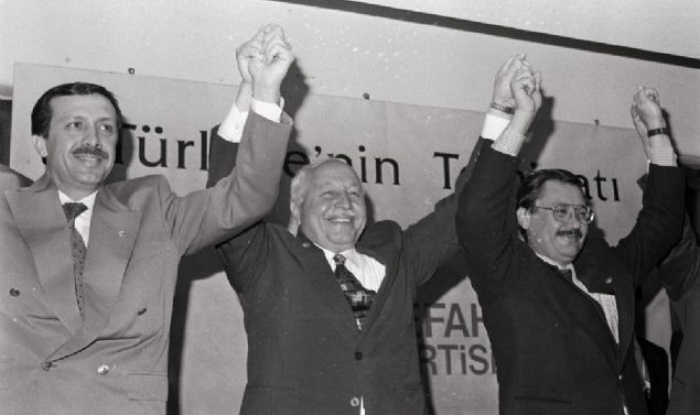Twenty-five years ago two young Islamist party candidates defied all odds and became the mayors-elect of Turkey’s two largest cities, İstanbul and Ankara. The success of the now-closed Welfare Party (RP) in the 1994 local elections paved the way for its success in the 1995 general election, making the RP the most popular Islamist party in Turkey’s history, with over 20 percent support. However, RP leader Necmettin Erbakan’s journey of glory was going to be disrupted by a military intervention three years later.
One of those young mayors, Recep Tayyip Erdoğan of İstanbul, has managed to make his way to the top, becoming the country’s first president with vast executive powers after a change in the system of governance in a narrowly backed 2017 referendum, while the other, Melih Gökçek of Ankara, remained mayor of the Turkish capital until his resignation that same year.
After the 2019 local elections, in which the ruling party lost İstanbul and Ankara in the initial vote count, many Turkey experts, observers, politicians and journalists recalled those days. A few courageously claimed that a shift in power was on the way.
Anyone who can read the numbers might easily assume that there is indeed a shift in power under way, but then it must be asked: Is it the end of President Erdoğan’s regime?
What is AKP’s share in reality?
According to the state-run Anadolu news agency, the ruling Justice and Development Party (AKP) garnered over 44 percent of the vote across the country; however, the number is deceiving because the AKP partnered with the Nationalist Movement Party in dozens of cities, especially in three big metropolises. Therefore, the AKP’s so-called vote, just over 44 percent, contains a significant number of votes from MHP supporters.
Seyfettin Gürsel, a Turkish academic and columnist, wrote that in 24 provinces, where the AKP and MHP were not allies but competitors, the latter increased its support from 18.2 percent to 27.9 percent compared to last year’s general election, while the former plunged from 48.8 percent to 37.8 percent.
Gürsel speculates that Turkish voters have indeed changed course from the AKP to other parties, but the new direction differs in various regions. In the Central Anatolian and middle Black Sea regions, disgruntled AKP voters cast ballots for the MHP, but in the Southeast they went for the Kurdish opposition.
In central Anatolia
Another two examples are from AKP strongholds Konya and Kayseri. In the 2014 local elections, the AKP garnered the support of around 65 percent in Konya. The MHP got 18 percent that year. While together they were able to reach 83 percent, in the 2019 local elections the AKP-MHP alliance received only 70.53 percent of the vote. In last year’s general election, their cumulative vote in Konya was 76 percent. Interestingly, their opponents’ share did not change much, remaining at near 20 percent in total.
The same pattern can be observed in Kayseri as well. While they had in total some 85 percent in the 2014 local elections in this Central Anatolian city, the AKP-MHP alliance could only win 63 percent of the vote in Sunday’s polls. A significant factor here was the İYİ (Good) Party, which broke off from the MHP after a 2017 referendum. This nationalist, right-wing party allied with Republican People’s Party (CHP) garnered more than 30 percent in Kayseri.
Nationalists on the rise
Polling expert Özer Sancar predicted before the local elections that the MHP grass roots might be reluctant to support AKP candidates in cities where these two parties were allied. His prediction may explain the plunge in Konya and Kayseri votes, but it’s not enough, obviously.
On the other hand, despite forming an alliance in more than 50 cities, the MHP competed with and outperformed the AKP in nine cities, one of which was Karaman, where the AKP had over 50 percent support in the 2014 local elections. Let’s remember, in last year’s presidential and parliamentary elections, although their alliance managed to attract some 52 percent support, it was the MHP that increased its support, while the AKP suffered a decline.
Public backlash over economy
A look at the metropolises, especially the six largest cities in Turkey, namely, İstanbul, Ankara, İzmir, Bursa, Antalya and Adana, clearly indicates that the AKP-MHP alliance also suffered from a public backlash stemming from a poor economy. According to the unofficial results, in five of these big cities the opposition alliance, CHP-İYİ Party, won the local elections. Although İzmir has always been a stronghold for the CHP, in İstanbul, Ankara, Antalya and Adana the municipalities changed hands.
Turkey went into a spiral of rising inflation and high interest rates after a currency crisis last summer, causing skyrocketing prices for everyday goods. Following a global financial crisis, which according to Erdoğan had a limited effect on Turkey, in the 2009 local elections the AKP had also faced an 8 percent decrease in nationwide votes, garnering only 38 percent and losing important mayoral posts in Antalya, Mersin and Adana.
In other words, when the main concern of Turkish citizens is the economy, support for the ruling party diminishes.
However, President Erdoğan still has the charisma to win a referendum or election that could threaten his status. Only clever management of municipalities in Turkey’s largest cities can break the spell in the long run, and that is why Erdoğan’s AKP will press harder to change the results in İstanbul, and even aim to undermine new mayors’ authorities at office.

